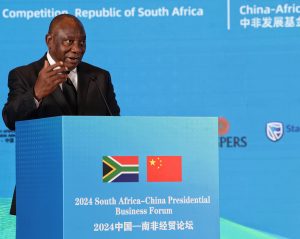Amid changing global power dynamics, China and South Africa have strengthened their alliance and established themselves as key architects in the creation of a new global order based on their shared aspiration. South African President Cyril Ramaphosa made a state visit to China in conjunction with the 2024 Forum on China-Africa Cooperation Summit, an important platform for advancing China-Africa relations. In Ramaphosa’s meeting with Chinese President Xi Jinping, both leaders restated their will to strengthen strategic alliances, growing economic cooperation, and aligning their development agendas.
On September 2, Ramaphosa and Xi declared that their bilateral relationship had been evolved to an “all-round strategic cooperative partnership in the new era.” This move reflects the determination of both nations to deepen their cooperation on global issues, boost economic cooperation, and build political trust. The declaration marks the beginning of a new era in the relationship between China and South Africa, promising more collaboration in crucial areas like commerce, technology, infrastructure, and people-to-people interactions.
The elevation of the China-South Africa relationship signifies a strong political congruence on issues like advancing a multipolar world order, supporting international institutional reform, and speaking up for the concerns of developing nations, especially in multilateral frameworks like the United Nations, BRICS, and the G-20. Moreover, a strengthened partnership could boost market access for South African products, attract Chinese investments, and foster collaboration in developing industries like the digital economy and renewable energy.
Trade between South Africa and China has always been unbalanced, with the former acquiring higher-value manufactured commodities from China while exporting raw materials such as minerals and agricultural items. Ramaphosa considers that the large deficit that has resulted from this trade relationship is not sustainable over the long run. According to data from the U.N. database Comtrade, South Africa imported a little less than $25 billion worth of Chinese commodities in 2023 but sold China items worth around $12.5 billion – meaning trade values are skewed 2-to-1 in China’s favor.
To bridge this gap, the South African president called for more equitable trade relations that promote the growth of local economies and jobs. He also urged China to import more South African value-added products, like manufactured goods, processed minerals, and finished agricultural products, instead of just raw materials. Exports of value-added products would help South Africa advance its industrial base, move up the value chain, and lessen its reliance on volatile raw commodity exports. Finally, Ramaphosa urged Xi to give priority to funding South African projects that promote long-term, sustainable economic growth.
The visit saw some areas of cooperation between China and South Africa. The latter had agreed to adopt China’s alternative to the U.S. Global Positioning System (GPS), the BeiDou Navigation Satellite System. By integrating BeiDou into its national infrastructure, South Africa gains access to a global satellite navigation system that is independent of Western control, thereby reducing reliance on GPS or Europe’s Galileo systems. This cooperation is a significant step toward enhancing South Africa’s technological capabilities and strategic autonomy.
In an effort to lessen South Africa’s rolling blackouts, which frequently leave residents without power for up to six hours per day, eight Chinese electricity businesses have pledged to donate equipment and technical assistance. In addition to providing South Africa with instant relief from its energy shortage, this partnership establishes China as an important ally with considerable political clout in the area.
Furthermore, the emphasis on new energy is consistent with the objectives of both countries regarding environmental preservation and sustainable growth. China and South Africa can strengthen domestic energy security and support international efforts to tackle climate change by allocating resources toward renewable energy, energy storage, and power transmission technology.
China recognizes South Africa’s position as a middle power rather than a developing economy, and as such, its attitude to the country is noticeably more measured than China’s approach to other African nations. A more assertive approach may jeopardize China’s standing internationally and hamper its larger plans for Africa. China will therefore probably take its time and carefully integrate itself into South Africa’s infrastructure in order to hold its position over time.
In terms of their alignment on international issues, South Africa’s support for China’s position on the Ukraine issue demonstrates how the two countries are in line with each other over the common goal of establishing a multipolar world order. Agreeing to China’s diplomatic approach, Ramaphosa reaffirmed South Africa’s commitment to non-alignment and dialogue-based conflict resolution by embracing China’s six-point plan on the political settlement of the Ukraine issue. In addition to strengthening each country’s influence and serving as a check on Western dominance in international decision-making processes, this cooperation in multilateral forums demonstrates a common effort to restructure international institutions to be more inclusive and sensitive to the concerns of developing nations.
As one of the most developed economies on the continent and a prominent member of the Southern African Development Community and the African Union, South Africa has significant sway over regional affairs and provides a gateway to deeper engagement with Africa. This adds to its strategic importance for China. South Africa’s ability to shape continental policies and its active participation in multilateral forums like BRICS and the G-20 are consistent with China’s objectives of enhancing South-South cooperation and advocating for a more balanced, multipolar global order.
The declaration of a China-South Africa “all-round strategic cooperative partnership in the new era” highlights a shared goal to strengthen political trust, economic ties, and cooperative efforts in vital areas like commerce, technology, and renewable energy. By addressing trade imbalances, advancing technological capabilities through projects like the BeiDou Navigation Satellite System, and encouraging investments in sustainable energy, both countries are putting themselves in a position of influence on the international scene. This dynamic relationship not only benefits their respective countries but also helps to reshape international institutions and frameworks to better represent the interests of developing nations.

































